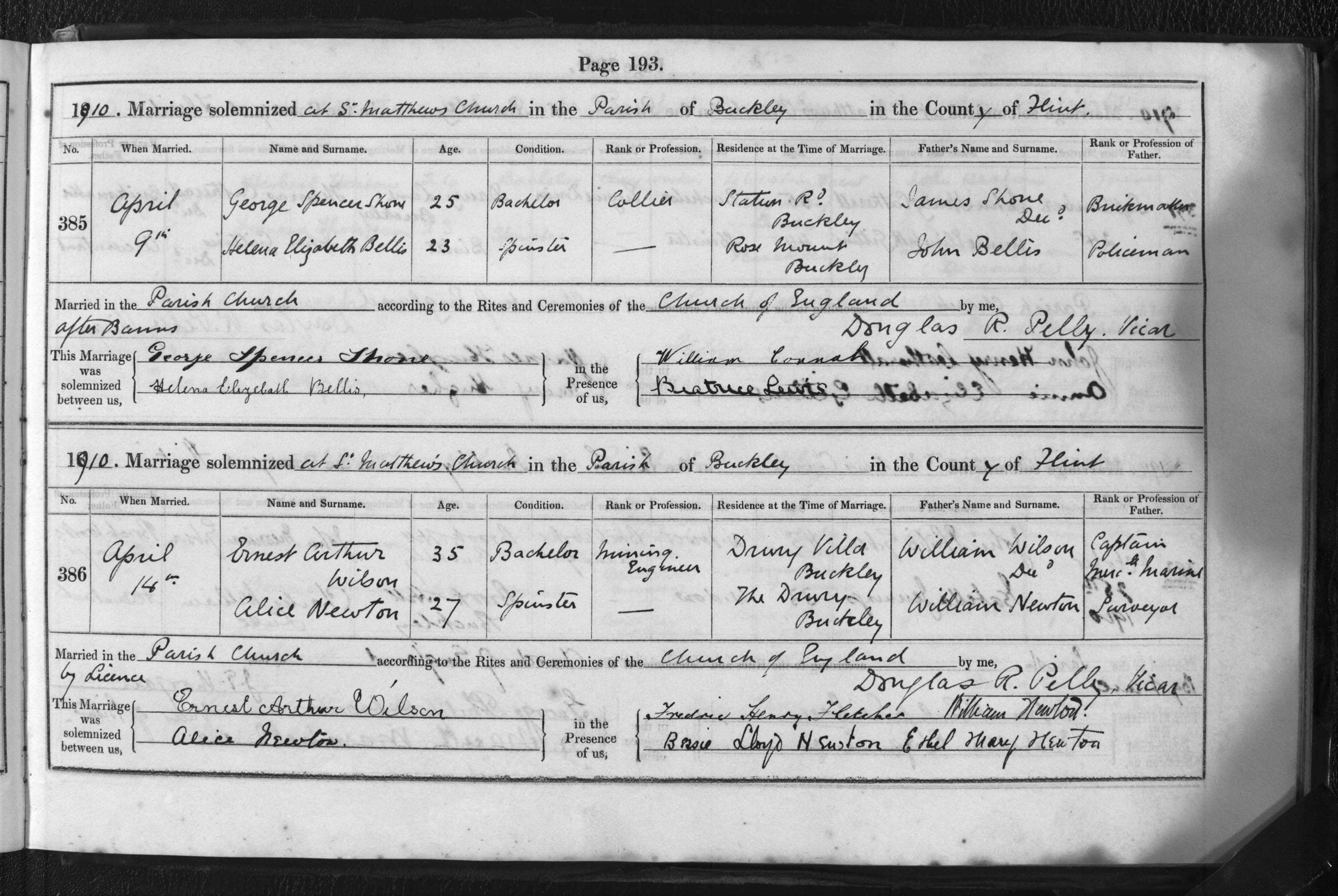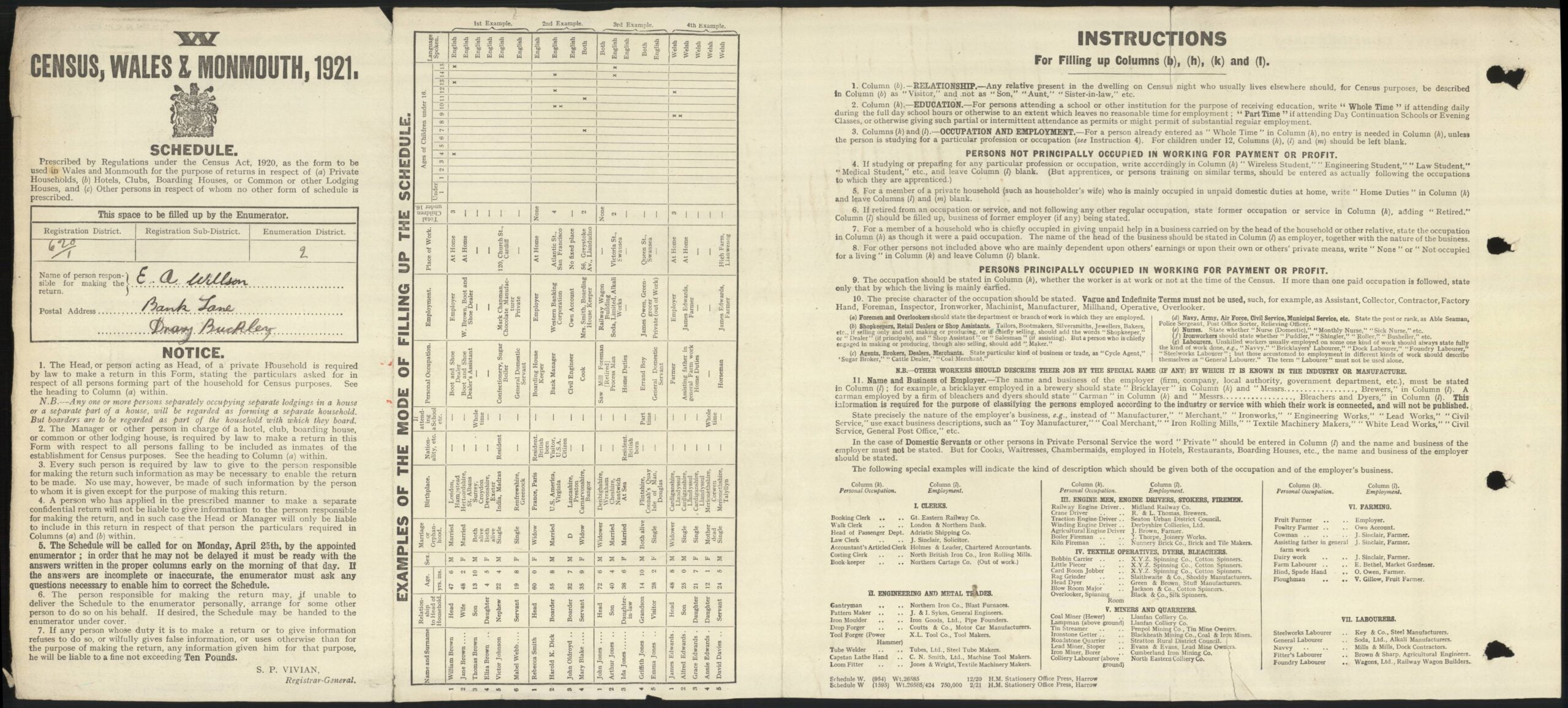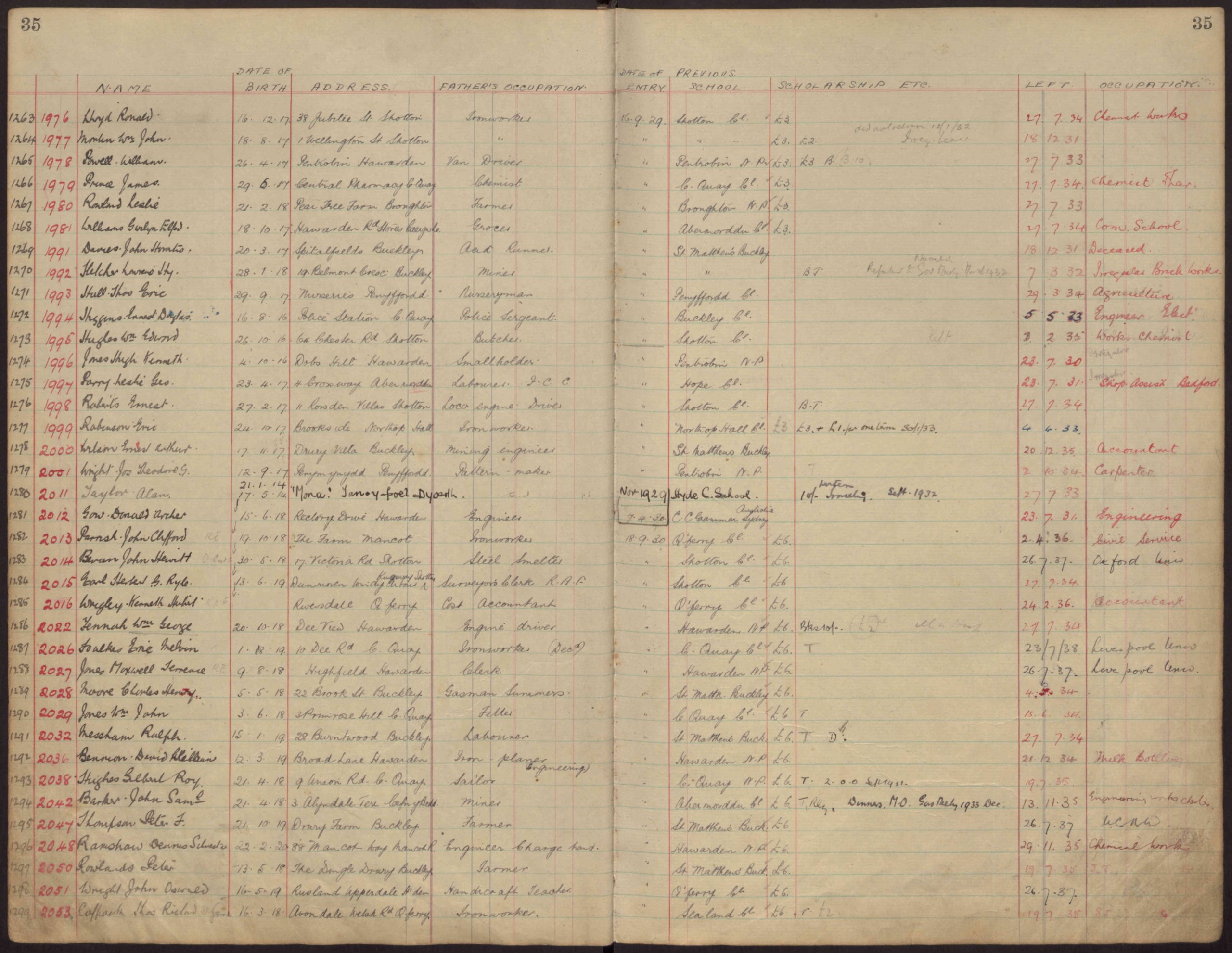Frederick William Newton Wilson’s story was a sad one, he had been born on the 17th of April 1916 and was the son of Ernest Arthur Wilson and Alice Newton, who were married at St. Mathew’s Church, Buckley on the 14th of April 1910, Ernest was a Mining Engineer, age 35 and lived at Drury Villa, Buckley, Alice was age 27 and lived at The Drury, Buckley. I believe that Ernest Arthur’s brother, William and Alice’s sisters, Bessie Lloyd & Ethel Mary were among the witnesses.
The 1921 census shows the little family living at Bank Lane, Drury, Buckley, Flintshire. Head of the household was Ernest Arthur Wilson aged 46 years and 3 months old, he was a Retired Mining Engineer. His wife Alice Wilson was 38 years and 3 months old. Their children were Frederick William Newton Wilson, age 5 years and 2 months old Ernest Arthur Wilson (Jnr.), 3 years and 6 months old and Herbert Collin Wilson 8 months old, all had been born in Hawarden Parish, Flintshire. There was a servant, Eleanor Tarran, 24 years, and 3 months old, single and born in Buckley, Flintshire. I think the family called her Nell, as Ernest Arthur Wilson had started to write her name as ‘Nel.’
Frederick had two brothers, Ernest Arthur, born in 1917 and Herbert Colin, born in 1920, who along with Frederick passed the scholarship to go to Hawarden County School, but their father Ernest was not alive to see this as he died in 1923, when little Herbert Colin was age 3.
Hawarden Grammar School Admissions Register E/GS/1/10
1179/1820 WILSON, Fred. Wm. Newton, Date of Birth – 17th April 1916, Drury Villa, Buckley, Father Mining Engineer (Deceased), 12th September 1927, Buckley N.P., Date of Leaving – 27th July 1934.
1278/200 WILSON, Ernest Arthur, Date of Birth – 17th November 1917, Drury Villa, Buckley, Father Engineer,16th September 1929, St. Mathews, Buckley, Date of Leaving – 20th December 1935 – Accountant.
1691/2397 WILSON, Herbert Collin (sic), Date of Birth – 13th October 1920*, Drury Villa, Buckley, Father Engineer (Deceased), 19th September 1933, Wrexham City, Date of Leaving – 25rd March 1937.
*Date of birth on the 1939 Register show 12th October 1920.
Alice and her boys were living at 51, Liverpool Road, Buckley on the 1939 Register which was taken on the 29th of September 1939, this, other than the Hawarden Grammar School Admissions book, is the only document that I have found that tells me anything about Frederick’s life before he is involved in the war. Alice, now a widow, is living on Private Means, Frederick is a Clerk with the Accountant at Flintshire County Council, Ernest Arthur is a Chemist Rayon Switchgear Man and Herbert is an Apprentice at Brookhursts.
I do not know when Frederick went into the Army and the war, but he was in the Royal Engineers, and I believe he was one of the many thousands of soldiers at Dunkirk. All of them experienced horrific incidents at the beaches, and if they didn’t get on the boats, afterwards escaping the Germans, Frederick being one of those, among hundreds of others, Soldiers and civilians, who were to be in the wrong place at the wrong time on the 17th of June 1940 and the Railway Station at Rennes. Frederick is buried at Rennes, and this was my first clue to his fate.
The Commonwealth War Graves Commission History Information tells us :-
“The majority of the casualties buried here resulted from the bombing of a troop train by the Germans on 17th June 1940. In addition, 26 casualties, including 3 married couples, were added in October 1945, when Short Stirling transport aircraft LJ668 from 299 Sqdn. crashed near Rennes on route from Cairo to the UK. There are 252 Commonwealth burials of the 1939-45 war here, of which 81 are unidentified.”
Please read the stories on the following websites, they tell a story of horrific deaths and injuries and I believe that Frederick was injured on that day in that incident, but died the following day of his injuries. He was 24 years of age.
Taken from :- WW2Peoples War.
https://www.bbc.co.uk/history/ww2peopleswar/stories/24/a7501024.shtml
RENNES, BRITTANY, FRANCE, JUNE 1940. AFTER DUNKIRK, ESCAPING TO THE WEST. CHAPTER 1. BY SGT_GEORGE
Dedication -This contribution is dedicated in remembrance of the more than 800 recorded British and French, both military and civilians, who died following a Luftwaffe bombing attack on the railway complex at Rennes in Brittany, France on Monday 17th June 1940.
https://www.bbc.co.uk/history/ww2peopleswar/stories/80/a3610180.shtml
RENNES, BRITTANY, FRANCE, MONDAY 17TH JUNE 1940. LUFTWAFFE ATTACK ON TRAINS.
Dedication – These three chaptered series of contributions is dedicated in remembrance of the more than 800 recorded British and French, both military and civilians, who died following a Luftwaffe bombing attack on the railway complex at Rennes in Brittany, France on Monday 17th June 1940.
https://www.bbc.co.uk/history/ww2peopleswar/stories/88/a7500188.shtml
RENNES, BRITTANY, FRANCE, JUNE 1940. AFTER DUNKIRK, ESCAPING TO THE WEST,. CHAPTER 2 SEQUEL.
Rennes Monday 17th June 1940, Chapter 2. 20 years after.
Sequel 18th July 2005
(Excerpt)
Monday June 17th, 1940, on a fine summer morning at 10:30a.m. death rained from the sky on stationary trains, packed with refugees and soldiers bottlenecked in the railway complex at Rennes, Brittany in western France. Over 800 people died, men, women and children together with British and French servicemen, when German dive bombers blasted train after train. One of those struck was a munitions train, its destruction caused fierce explosions, which ripped through the morning air and spiralled bodies and debris in all directions.
Amongst those killed were servicemen left behind after the mass evacuation of the British Expeditionary Force from Dunkirk, which had ceased two weeks previously. Contrary to popular myth the BEF was not totally evacuated by that time. There remained a dispersed and straggling army of about 150,000 men, now fleeing westwards in groups of various sizes and in the forlorn hope of making their escape as best they could, the grim alternatives being death or prisoner of war camp. But on this day in Rennes, the hope of escape for one group, would die.
https://www.bbc.co.uk/history/ww2peopleswar/stories/17/a4195217.shtml
EVACUATING RENNES JUNE 1940 BY CSV ACTIONDESK AT BBC OXFORD
I believe that Alice Wilson was to live to the grand old age of 95, 55 years after her husband of 13 years died in 1923. (Registration Date: Mar 1978. Registration district: Delyn, Inferred County: Clwyd, Volume: 24, Page: 0357)
If anyone can add to Frederick’s earlier life it would be very much appreciated, so he is not forgotten. He was remembered of course by the Hawarden Grammar School, and his name is on the Roll of Honour. The Roll of Honour was dedicated at Hawarden Grammar School on the 3rd of February 1951 with a Remembrance Service for the 47* former pupils who died in the 1939 – 1945 World War. As recorded in the Chester Chronicle Saturday 10th February 1951.
*Author’s note, there are 46 names on the Roll of Honour, clerical error by the newspaper.
I hope that his family were able to attend. Frederick William Newton Wilson is also remembered on the Buckley WW2 War Memorial, please click on the link to read his story.





